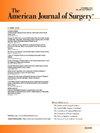Impressions of inclusivity within orthopedic surgery: Differences amongst women, minority, and LGBTQIA medical students
IF 2.7
3区 医学
Q1 SURGERY
引用次数: 0
Abstract
Objective
To better understand reasons for the underrepresentation of certain groups in orthopedic surgery, we investigated whether there were differences in medical students’ perceptions of inclusivity in orthopedic surgery between (1) men and women, (2) White, Asian and URiM, and (3) LGBTQIA and non-LGBTQIA students.
Design
A one-time survey consisting of validated and/or previously used instruments measuring students' sense of belonging in orthopedics, prospective belonging uncertainty (an individual's worry that they will not fit in), stereotype threat (the effect of negative stereotypes on stereotyped group-members), and pluralistic ignorance (erroneously believing your beliefs are different than “typical” group-members).
Setting
The survey was distributed at Loyola University, St. Louis University, University of Michigan, and Washington University in St. Louis.
Participants
All medical students at these institutions were offered participation, and 441 medical students completed the survey (∼20% response-rate).
Results
There was a lower sense of belonging for each of the following groups when compared to their majority-group peers: women (mean difference = 0.5, 95% CI 0.3–0.7, p < 0.001), Asian students (mean difference = 0.4, 95% CI 0.1–0.7, p < 0.001), URiM students (mean difference = 0.4, 95% CI 0.07–0.7, p < 0.001) and LGBTQIA students (mean difference = 0.4, 95% CI 0.07–0.6, p = 0.003). Medical students perceived that orthopedic faculty, residents, and the general public believe that men are better orthopedic surgeons than women, and that White surgeons are better surgeons than non-White surgeons. Women reported less confidence to succeed in orthopedics compared to “typical” peers (mean −0.5, SD 1.3), whereas men felt similar confidence compared to their peers (mean 0.1, SD 1.3; mean difference 0.6, 95% CI 0.4–0.9, p < 0.001).
Conclusions
These differences in belonging, prospective belonging uncertainty, stereotype threat, and pluralistic ignorance provide insight into how medical students perceive the inclusivity of orthopedics, which may ultimately play a role in the underrepresentation of minority groups.
矫形外科的包容性印象:女性、少数民族和 LGBTQIA 医学生之间的差异。
目的:为了更好地了解某些群体在骨科手术中代表性不足的原因,我们调查了医科学生对骨科手术包容性的看法是否存在以下差异:(1)男性和女性;(2)白人、亚洲人和乌拉圭人;(3)LGBTQIA 和非 LGBTQIA 学生:设计:一次性调查,由经过验证和/或以前使用过的工具组成,测量学生对骨科的归属感、未来归属的不确定性(个人担心自己无法融入群体)、刻板印象威胁(负面刻板印象对刻板群体成员的影响)和多元无知(错误地认为自己的信仰与 "典型 "群体成员不同):调查在洛约拉大学、圣路易斯大学、密歇根大学和圣路易斯华盛顿大学进行:441 名医学生完成了调查(回复率为 20%):结果:与多数群体的同龄人相比,以下每个群体的归属感都较低:女性(平均差异 = 0.5,95% CI 0.3-0.7,p 结论:与多数群体的同龄人相比,以下每个群体的归属感都较低:女性(平均差异 = 0.5,95% CI 0.3-0.7,p这些在归属感、预期归属感不确定性、刻板印象威胁和多元无知方面的差异为医科学生如何看待骨科的包容性提供了启示,这可能最终导致少数群体代表性不足。
本文章由计算机程序翻译,如有差异,请以英文原文为准。
求助全文
约1分钟内获得全文
求助全文
来源期刊
CiteScore
5.00
自引率
6.70%
发文量
570
审稿时长
56 days
期刊介绍:
The American Journal of Surgery® is a peer-reviewed journal designed for the general surgeon who performs abdominal, cancer, vascular, head and neck, breast, colorectal, and other forms of surgery. AJS is the official journal of 7 major surgical societies* and publishes their official papers as well as independently submitted clinical studies, editorials, reviews, brief reports, correspondence and book reviews.

 求助内容:
求助内容: 应助结果提醒方式:
应助结果提醒方式:


